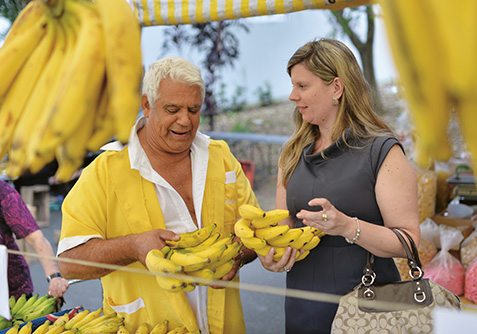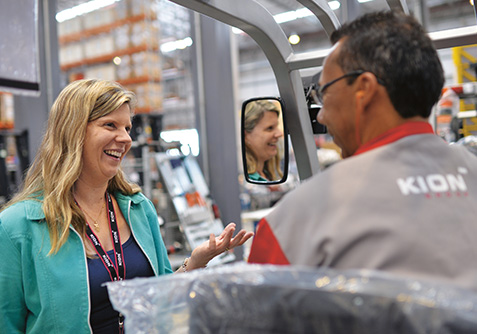A rapidly growing market. Increasingly complex logistics demands. In emerging markets, forklift trucks and warehouse technology are replacing muscle power and hand trucks to an ever greater degree. And no one knows this better than Cristine Sauter.
The mountains of exotic fruit and vegetables are stunning; the displays extend as far as the eye can see in the gigantic market halls in the heart of the booming Brazilian city of São Paulo. Workers still load heavy crates of pineapples, melons and bananas onto traditional carrinhos – slender, makeshift wooden barrows – and manoeuvre them manually through the narrow aisles between market traders and piles of boxes. Cristine Sauter watches the hustle and bustle with great interest. “We could sell loads of forklift trucks here,” says the 37-year-old HR manager of KION South America. “The potential for us here is enormous.”
Everywhere is booming in this city of over eleven million inhabitants. Newly renovated buildings peek out between the high-rises, some extremely run-down, while residential and office complexes tower into the sky. Despite the heat, suits are the order of the day in broad Avenida Paulista, the Wall Street of São Paulo.
Recently, demand for high-quality Linde and STILL products has risen sharply, with the KION Group’s unit sales in Brazil reaching a record high in 2013. It was only a question of time before the plant in Rio de Janeiro reached full capacity. Cristine Sauter belonged to a small group of KION staff members who organised the relocation and fresh start at a brand-new factory near São Paulo.
She had the expertise required, because Cristine is a real Paulista – born and bred in the city. Her grandparents migrated there from Hamburg years ago, but the 37-year old speaks perfect German, as well as Portuguese, English and Spanish. She could navigate the chaotic traffic on the congested multi-lane streets of São Paulo in her sleep.
Looking for staff by loudspeaker
The plant is in Indaiatuba, an hour’s drive from the city. “When we started in 2012, it was a greenfield site. There were five of us, including the CEO Frank Bender, and our office started out in a former farmhouse,” she says. With a recently opened freight terminal, Indaiatuba offered better infrastructure and greater security than Rio.
When the plant was up and the machinery installed, Cristina had to recruit a qualified workforce of 120 within three months. The question was how to do this in a booming region where the unemployment rate is strikingly low, at around one per cent. “One thing we did was to send cars with loudspeakers out into the streets to spread the message that we were offering attractive jobs,” reports Cristina. This actually helped, as German employers are popular in Brazil, not least because they pay wages on time. The HR manager selected all the new employees personally. “In Brazil, direct contact is very important.”
It just had to be Brazil
The new plant, which produces counterbalance trucks and warehouse technology, was officially opened in March 2013. The workforce rose to 200 within a few months – creating plenty of work for Cristine Sauter. She uses two mobile phones to manage her job, juggling it with her private life, which involves four small children, a Labrador puppy and a new house-build. In her spare time, she is also studying for an MBA.
For Cristine Sauter, it had to be Brazil. As a young woman she lived in Saarbrücken for a few years where she studied business administration, but afterwards she wanted to go back home. “At that time, things were too slow for me in Germany.” And why did she join the KION Group? “Here I’m free to organise things myself, which is unusual in Brazilian companies. And setting up a new plant was amazing, it was like a start-up.”
She cannot get away from her German roots, nor does she want to. Her grandfather taught her the importance of a good education. “He always said that nobody can take that away from you,” she recalls. Cristina passes this philosophy on to her staff as well as her children. She works closely with the IFPA German technical college in São Paulo where young employees study for qualifications in areas such as freight forwarding and industrial management under the dual vocational training system. They get their practical experience at the plant in Indaiatuba. This is a new concept for Brazil – and it gives the KION Group a distinct competitive edge.
-
Attractive market with growth profile above GDP.
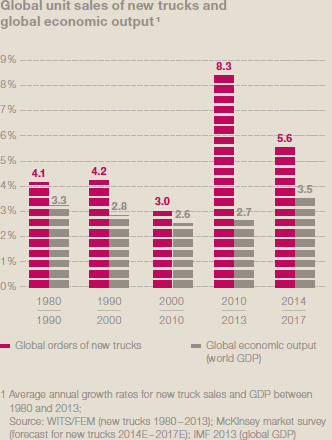
The KION Group operates in an attractive market that is growing faster than global economic output.
The worldwide market for industrial trucks grew at roughly 1.4 times the rate of the global economy between 1980 and 2013. Industry experts reckon that this pace is set to accelerate slightly over the period up to 2017.
This scenario is being driven by three global mega-trends:
- the industrialisation of the emerging markets,
- the advancing globalisation of world trade and, as a consequence, the increasing transportation of goods around the world,
- the growing fragmentation of supply chains and value chains: just-in-time logistics and purchases from online retailers create demand for the KION Group’s products and services.
-
A global leader– strong home base ...
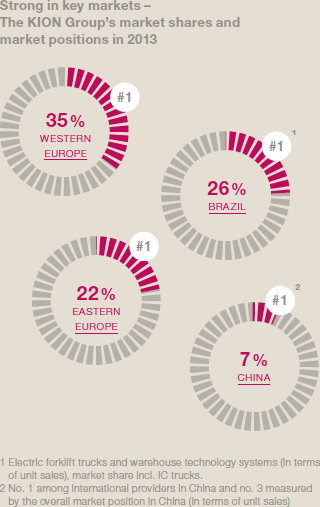
Measured in terms of new trucks sold, the KION Group is currently number one in the European market and number two in the market worldwide. And with a presence in more than 100 countries, the company is the world’s biggest specialist provider of materials handling trucks and associated services.
Our strong position in western Europe, where we have a market share of 35 per cent (2013), is the basis for the global expansion of the KION Group. The foundation of our business is stable in this region because of replacement purchases and a strong service business.
After plunging into a deep crisis, Europe’s market for industrial trucks is now recovering. Since 2010 the KION Group has benefited from this trend with a double-digit percentage increase in revenue in Germany and the rest of Europe.
-
... and well positioned in growth markets.
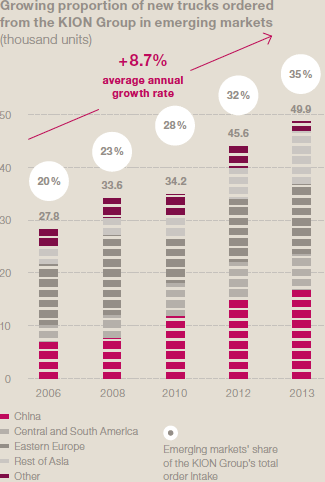
The KION Group’s leading position in emerging markets such as India, China, South America and eastern Europe means that it is excellently placed to fully exploit the growth opportunities available there. In 2013 the KION Group’s brand companies sold 35 per cent of their new trucks in emerging markets – and this proportion is set to rise sharply.
A case in point is China, which is the world’s largest individual market for the KION Group’s products. The Company has been firmly established here with its offering of development, production and services for more than two decades and is the leading non-domestic supplier. The KION Group is the third-largest player in this market, where it employs some 3,200 people. China is now the Company’s second-biggest market in terms of unit sales (behind only Germany).
-
Technology leadership drives premium positioning ...
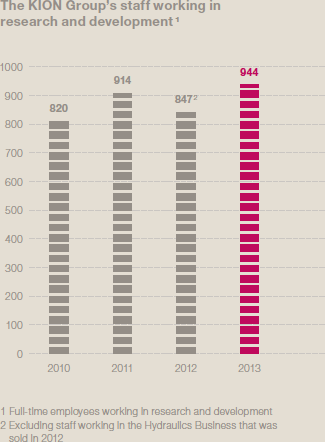
The KION Group is right in the vanguard when it comes to technology and innovation. By spending in excess of €114 million on research and development in 2013, the Company is a leader in its sector.
Over 900 people work at ten research centres in Europe, Asia and the Americas to devise forward-looking solutions; more than a quarter of them are based in China so that they are close to their market. This continuous R&D investment means that clients in all markets and segments can expect to have a fully customised range of trucks and services to choose from.
In 2013 the KION Group launched more than a dozen new trucks and truck families in the market, thereby providing added impetus for 2014, and a number of new products and services are set to be introduced this year as well.
-
... and customer value.
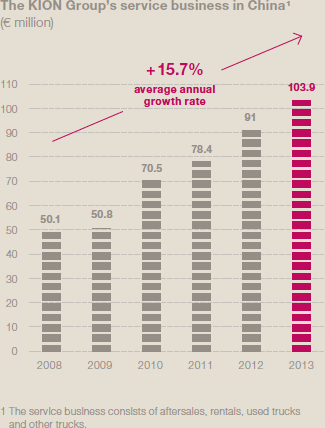
Customers of the KION Group particularly benefit from the industrial trucks’ good handling capacity and very low running costs throughout their lifecycle.
The cost benefits for customers mean that the KION Group can set prices at a level that enables it to achieve higher margins than its competitors. After all, personnel expenses and the cost of operating a truck over its lifecycle constitute a significant portion of the purchase price, especially in highly developed markets.
The proximity of the KION Group’s brand companies to their customers also ensures a high level of availability for the trucks. Around the world, around 12,900 inhouse and external service engineers work for the KION Group. This business offers considerable potential also outside of Europe: in China, revenue from services has risen substantially in recent years.
-
Robust integrated business model with high contribution from services.
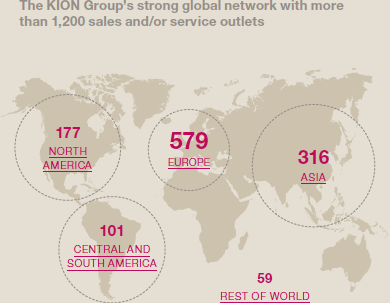
This provides the basis for the KION Group’s lasting business success. Customer services, truck rentals, used trucks and spare parts together contribute more than 40 per cent of revenue. This business is very resilient to fluctuations in the economic cycle. Moreover, it generates particularly good margins for the KION Group.
There are around 1.2 million KION trucks in use around the globe, forming a broad basis for a strong and integrated service business.
A comprehensive network of more than 1,200 sales and/or service outlets worldwide ensures that the KION Group is never far from its customers. This creates strong customer loyalty, which in turn offers more potential for growth and provides a lasting competitive advantage.
-
Strong profitability – well prepared for future value creation.
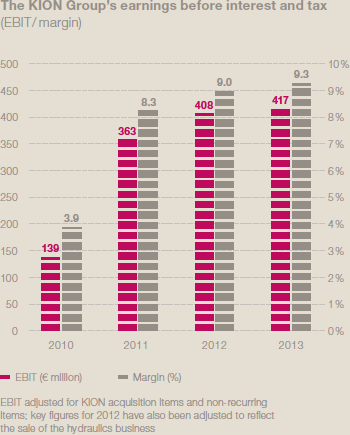
Constantly improving efficiency and profitability is a clear objective for the KION Group. Size and synergies – a combination that makes the KION Group stand head and shoulders above other truck manufacturers.
This involves collaborating on research and development, improving plant structures and fully exploiting the economies of scale created by a worldwide production network. Other areas of focus are the optimal use of shared, cross-brand modules and platforms and the ongoing expansion of the service business.
-
Highly motivated and qualified employees with proven track record.
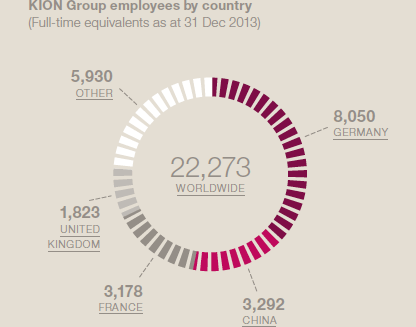
International, highly qualified and highly motivated: the KION Group’s more than 22,000 employees, who demonstrate dedication and creativity day in, day out, are both the heart and the backbone of the company.
Their hard work underpins the operational success of the company and ensures a strong financial performance. This was one of the key elements in the successful stock market flotation of the KION Group in June 2013.
The company’s growth strategy is reflected in the structure of the workforce. In 2013, the Group recruited extra staff for its service and sales operations and notably invested in new employees in the emerging markets and growth regions. The KION Group is increasingly hiring local management in all its markets in order to utilise their strong market knowledge and expertise.

